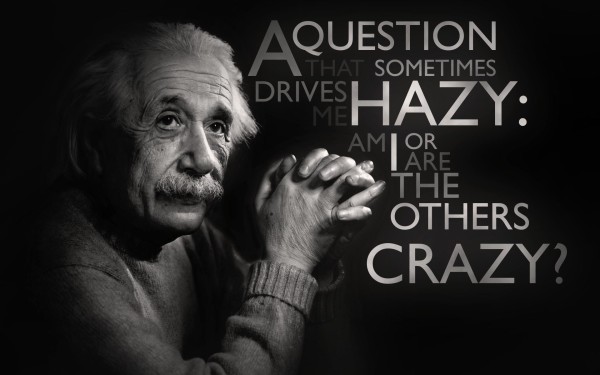
Born on the 14th March 1879, Albert Einstein was one of several great minds that were born within the German city of Ulm. Other great minds were Max Bentele – the creator of the Wankel Rotary Engine (as seen in many vehicles, most recently the Mazda RX-8) and Albrecht Berblinger, pioneer of a working hang-glider-esque flying machine.
At an early age, his father, a well respected engineer, moved the family to Munich where he aimed his electrical product sales at supplying direct current electrical equipment – this was a highly competitive market as he was against the alternating current market. Based on his father’s forte as an electrician, science definitely ran in the family! According to Albert’s autobiography, on being shown a pocket compass at a young age, Albert very quickly realized that there must be other forces involved, despite the needle appearing in ’empty space’. This was where Albert’s world was about to get very interesting.
Over the course of the next few years, up to age 10, Albert would learn of mathematical thinking and design machinery and mechanical devices as an outlet for his growing comprehension of the world around him. One book in particular, given to him by a family friend named Max Talmey, Euclid’s Elements,” Einstein nostalgically referred to as the “Holy little geometry book”.
Following the failure of his father’s business venture, which was pushed asunder due to the rise of alternating current defeating direct current, the family relocated to Italy. Their destination was the town of Pavia. In this Italian commune, the first of Albert’s contributions to the Universe was noted. He produced a short essay titled “On the investigation of the State of the Ether in a Magnetic Field.” Whilst this only reached his uncle, Caesar Koch, it was the first rung on the ladder of Einstein’s understanding of the Universe.
Albert’s academic achievements were never great – he failed to pass an entrance examination to enter the Swiss Federal Polytechnic (Zurich) but left an excellent impression in his Mathematics and Physics grades which allowed him passage to complete his education.

To avoid military duty, Einstein managed in 1896 to renounce his German citizenship and remained in Switzerland studying for a Mathematics and Physics Diploma. After graduating with a teaching diploma, Einstein found life particularly tough on the employment front (sounds similar to now?!). It was due to a friend’s father and his influence that secured him his first job as a patent examiner for electromagnetic devices in Bern. In 1905, Einstein successfully completed his thesis, titled “A new determination of Molecular Dimensions”, granting him a PhD (Doctorate). The very-same year as his thesis, some of his greatest works were also published – coined his ‘annus mirabilis’ (latin def: miracle year).
Focusing in on his key contribution areas, he published papers on the photoelectric effect (where electrons are emitted from all matter due to their absorption of electromagnetic radiation); Brownian Motion (the random motion or particle theory); special relativity (theory that all uniform motion is relative and there is no absolute well-defined state of rest) and his most famous paper… the Mass – Energy equivalence.
Otherwise known as E = mc².
These papers steamrolled Einstein into the spotlight of Academia and come 1908, became a recognized leading scientist. By 1911, he had calculated that light from a distant star would be bent by the Sun’s gravity. Later confirmed by Sir Arthur Eddington during a Solar Eclipse, the resultant worldwide media attention made Einstein a household name from this point forward. Jumping ahead to 1933, Einstein visited the United States of America and decided that due to the rise of Nazism in Germany, that he did not wish to return to his homeland.
Assisting with this endeavour temporarily, he managed to secure a short-term visiting professorship status from the California Institute of Technology. Sadly, the finite nature of the contract expired which meant that he had to return to Europe – Belgium. After finding himself on the Nazi ‘Assassination’ list, he immediately aimed to return to the USA, via UK. During 1939, Einstein had a conflict of ethics and morals which saw him having to warn the USA, Roosevelt, of a Nuclear weapons race – one of which that the Nazi warmachine had already started. It is believed that Einstein’s letter was the catalyst that saw the Manhattan Project be authorised.
The conflict between creation and destruction was felt by Einstein afterwards in 1954 when he stated “I made one great mistake in my life — when I signed the letter to President Roosevelt recommending that atom bombs be made; but there was some justification — the danger that the Germans would make them…”. On the 17th April 1955, Einstein’s long standing aortic aneurysm burst – surgery was offered, but he refused, stating adamantly that “I want to go when I want. It is tasteless to prolong life artificially. I have done my share, it is time to go. I will do it elegantly.”
He died the next morning in Princeton Hospital.
Albert Einstein, we owe our deeper understanding of Physics and the Universe to your great efforts, thank you for providing us with the tools for the future of Science.